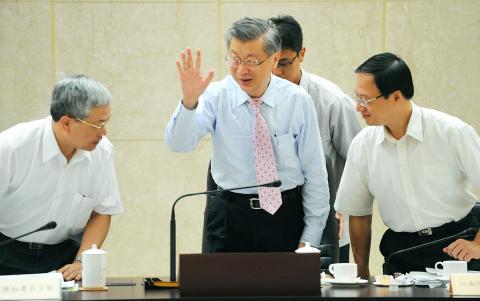Premier Sean Chen (陳冲) yesterday vowed to relax restrictions on financial exchanges between Taiwan and China to develop the financial sector and industries “with cross-strait characteristics,” as well as a wealth management platform favored by Taiwanese.
At a three-hour closed-door meeting, “there was a high level of consensus” on the 26 agenda items to resolve major issues facing the banking, securities and insurance industries, Financial Supervisory Commission Chairman Chen Yuh-chang (陳裕璋) told a press conference.
The meeting, presided over by Sean Chen, was attended by 42 representatives from the financial sector representing 11 associations and officials from related agencies. It was the third of a series of five symposiums aimed at devising plans to revive the economy.

Photo: CNA
In view of the increasingly close economic and trade relationships between Taiwan and China, Sean Chen ordered the establishment of an inter-governmental task force to promote cross-strait activities in financial services, to boost the industry and expand its services for Taiwanese individuals and businesses based in China.
The government would seek early completion of ongoing negotiations with China on an agreement on cross-strait currency clearance and of talks to allow domestic banks to conduct yuan business, while it would also allow domestic banks to cooperate with counterparts in China so that people can use domestic financial cards to make card payments and cash withdrawals in China, Chen Yuh-chang said.
Taiwan Securities Association chairman Hwang Min-juh (黃敏助) said he appreciated that the government agreed to the suggestions that securities dealers would be allowed to provide offshore securities trading and that China-based Taiwanese businesses would be allowed to launch primary listings on the Taiwan Stock Exchange.
Chen Yuh-chang said that the government is also aiming to make institutions in the nation’s financial sector the best choice in wealth management for Taiwanese.
The strategy is to divert local customers from offshore companies to local companies to boost the development of local financial institutions and to cultivate talents, he said.
Life Insurance Association of the Republic of China chairman Hsu Shu-po (許舒博) said that insurance companies would like to make investments in public infrastructure projects and community healthcare projects for the growing elderly population — the implementation of which has been long delayed because of the government’s dire financial position.
On average, insurance companies in Taiwan receive revenue of NT$2 trillion (US$66.8 billion) annually, while only less than 1 percent of its disposable funds, or about NT$1.2 trillion, is used in public infrastructure projects, Hsu said.
“If the government relaxes the rules on investments made by insurance companies in public constructions, we can contribute to boost economic growth and improve unemployment problems,” he said.

“China is preparing to invade Taiwan,” Deputy Minister of Foreign Affairs Francois Wu (吳志中) said in an exclusive interview with British media channel Sky News for a special report titled, “Is Taiwan ready for a Chinese invasion?” the Ministry of Foreign Affairs said today in a statement. The 25-minute-long special report by Helen Ann-Smith released yesterday saw Sky News travel to Penghu, Taoyuan and Taipei to discuss the possibility of a Chinese invasion and how Taiwan is preparing for an attack. The film observed emergency response drills, interviewed baseball fans at the Taipei Dome on their views of US President

The Central Weather Administration (CWA) today issued a "tsunami watch" alert after a magnitude 8.7 earthquake struck off the Kamchatka Peninsula in northeastern Russia earlier in the morning. The quake struck off the east coast of the Kamchatka Peninsula at 7:25am (Taiwan time) at a depth of about 19km, the CWA said, citing figures from the Pacific Tsunami Warning Center. The CWA's Seismological Center said preliminary assessments indicate that a tsunami could reach Taiwan's coastal areas by 1:18pm today. The CWA urged residents along the coast to stay alert and take necessary precautions as waves as high as 1m could hit the southeastern

ECONOMIC BENEFITS: The imports from Belize would replace those from Honduras, whose shrimp exports have dropped 67 percent since cutting ties in 2023 Maintaining ties with Taiwan has economic benefits, Ministry of Foreign Affairs officials said yesterday, citing the approval of frozen whiteleg shrimp imports from Belize by the Food and Drug Administration (FDA) as an example. The FDA on Wednesday approved the tariff-free imports from Belize after the whiteleg shrimp passed the Systematic Inspection of Imported Food, which would continue to boost mutual trade, the ministry said. Taiwan’s annual consumption of whiteleg shrimps stands at 30,000 tonnes, far exceeding domestic production, the ministry said. Taiwan used to fill the gap by importing shrimps from Honduras, but purchases slumped after Tegucigalpa severed diplomatic ties with Taiwan

The Executive Yuan yesterday approved a southwestern extension of the Sanying MRT Line from New Taipei to Bade District (八德) in Taoyuan, with a goal of starting construction by late 2026. The 4.03-kilometer extension, featuring three new stations, will run from the current terminus at Yingtao Fude Station (LB12) in New Taipei City to Dannan Station (LB14), where it will connect with Taoyuan’s Green Line, New Taipei City Metro Corp said in a statement. This extension will follow the completion of core Sanying Line, a 14.29-kilometer medium-capacity system linking Tucheng (土城), Sansia (三峽)